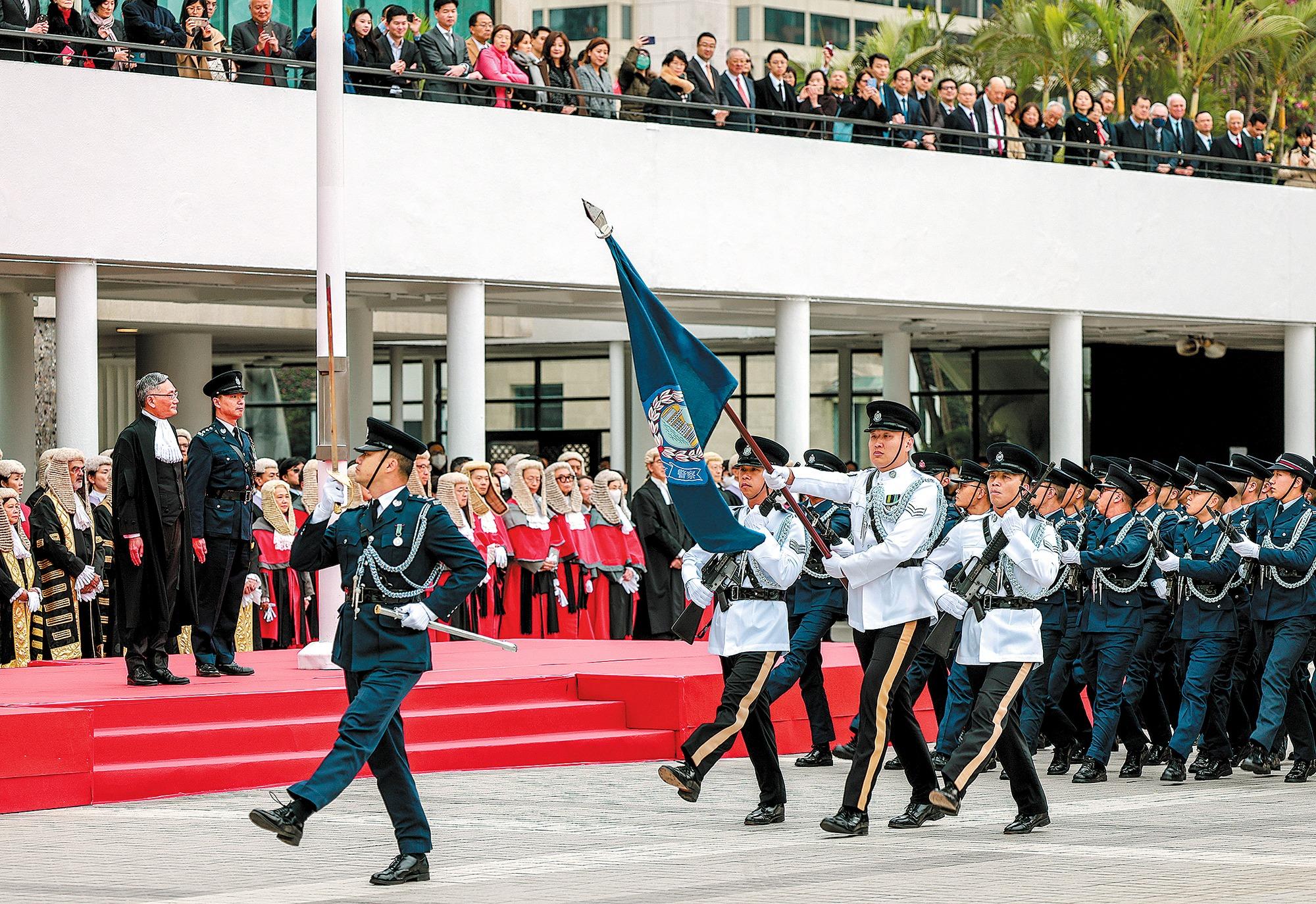 Andrew Cheung Kui-nung (left), chief justice of the Court of Final Appeal, inspects a Ceremonial Guard mounted by the Hong Kong Police Force at Edinburgh Place during the Ceremonial Opening of Legal Year 2024 on Jan 22, 2024. (ANDY CHONG / CHINA DAILY)
Andrew Cheung Kui-nung (left), chief justice of the Court of Final Appeal, inspects a Ceremonial Guard mounted by the Hong Kong Police Force at Edinburgh Place during the Ceremonial Opening of Legal Year 2024 on Jan 22, 2024. (ANDY CHONG / CHINA DAILY)
The Hong Kong judiciary will not yield to any pressure or threats of any kind in national security cases as in any other type of cases, the city’s chief justice and the secretary for justice pledged on Monday.
The remarks were made at the Ceremonial Opening of Legal Year 2024, the city’s annual flagship judiciary event that brought together the legal community and demonstrated its stable and strong rule of law.
The Hong Kong judiciary has a duty to effectively prevent, suppress and impose punishment for any act or activity endangering national security in accordance with the National Security Law for Hong Kong and the judiciary takes this duty seriously, said Chief Justice of the Court of Final Appeal Andrew Cheung Kui-nung.
“The courts will not yield to any pressure to convict or acquit, nor pay heed to harassment or threats of any kind,” Cheung said.
In response to threats of sanctions put forward by US congressmen earlier, Cheung told the media after the ceremony that it is not acceptable and runs against the rule of law and judicial independence to make such threats of sanctions or reprisals against judges, regardless of the person or groups that the threats come from.
He noted that the work of the judiciary, which has often been viewed through the prism of the National Security Law, and the city’s rule of law and judicial independence have been perceived in a very narrow or even distorted picture in terms of breadth and depth.
Pledging that the city’s courts and judges will continue to discharge their constitutional duty to administer justice fairly and efficiently, Cheung said it is also essential to the continuation of the city’s common law system, which in Cheung’s opinion is “a remarkable accomplishment for our country and Hong Kong itself, as the embodiment of the successful implementation of the ‘one country, two systems’ arrangement”.
Under the Basic Law, Hong Kong remains a common law jurisdiction, an arrangement that was reaffirmed as a long-term State policy by President Xi Jinping during his inspection tour to the city in 2022. The advantages and benefits in continuing with the common law system in Hong Kong are clear, he said.
At the same event, Secretary for Justice Lam Ting-kwok said it is of the utmost importance to ensure that the judiciary is able to exercise its power without any interference in national security cases, as with any other type of cases.
“Without security and stability, there cannot possibly be prosperity. To safeguard our country’s sovereignty and security, the judiciary is under a constitutional duty to effectively prevent, suppress and impose punishment for any act or activity endangering national security,” Lam stressed.
Calling proposals to sanction the city’s judges and judicial officers handling national security as “political maneuvers” aimed at smearing the city’s National Security Law and at pressuring or deterring judges and judicial officers from taking part in national security cases, Lam said the threats smack of a high degree of hypocrisy, carried out under the guise of “concerns about the rule of law in Hong Kong”.
The best way to handle such improper interference is to stay composed and carry on with judicial duties, while maintaining the transparency of the judicial process, Lam said, adding that the HKSAR government will ensure that judges and judicial officers will be able to perform their functions without fear from intimidation.


